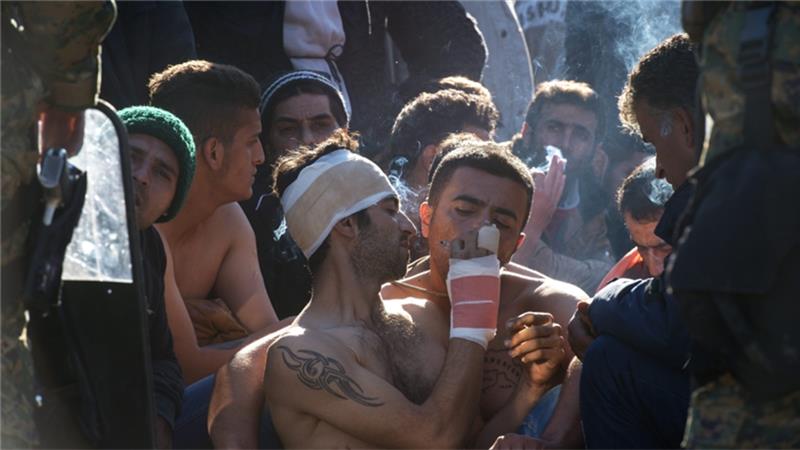
Al Jazeera News :A group of refugees stranded at the Greece-Macedonia border have launched a hunger strike in protest against a filtering system by some Balkans countries which began days ago, rejecting those classed as “economic migrants”.The hunger strikers at the Idomeni border crossing are among thousands of asylum seekers now trapped at borders.Images have been posted on social media showing several refugees, reportedly including Iranians and Kurds, sewing each other’s lips shut with nylon and a needle.Amid a sit-in attended by fellow asylum seekers, they protested against measures enacted on November 17 by four Balkan governments led by Slovenia, which blocked refugees that could not prove citizenship from Syria, Afghanistan or Iraq.The rejection by Slovenia, Macedonia, Croatia and Serbia triggered a build-up of refugees at Balkan borders, including some from the priority nations but without papers.”At this moment the worst situation is at the Idomeni border crossing in Greece, where at least 2,000 Iranians, Moroccans and other nationals are stranded after the border was closed for everyone except Syrian, Afghan and Iraqi refugees,” Zagreb-based Milena Zajovic, spokesperson for the Are You Syrious group aimed at keeping refugees informed, told Al Jazeera.”Volunteers have witnessed very shocking situations during the past few days. One desperate Pakistani man tried to hang himself in front of everyone on Saturday, while today [Monday] a group of Iranians started sewing up their mouths in an act of protest. “The camp in Idomeni is already full of the people who are not allowed to cross the border. Lots of them can’t go back to their homelands as they would be criminally prosecuted. The situation is very tense.”Zajovic added that the measures taken by the Balkan countries stripped people of their right to seek asylum. “You can’t just declare all of the potential asylum seekers from one country ‘economic migrants’ and send them back without knowing what they are running away from. Every asylum seeker should have the right for his case to be heard. At this moment, EU is taking this right away from them.”Macedonia’s President Gjorgje Ivanov said on Saturday that the influx of “migrants” into the country has heightened tensions “between refugees and migrants, the migrants and police and army, and between migrants and local people”.He said Macedonia has the capacity to shelter about 2,000 people in its temporary transit centres and any increase in numbers would “increase permanent and direct threats and risks for the national security”.The move to filter refugees came amid fears prompted by recent attacks in Paris that among the hundreds of thousands of refugees trying to escape war and persecution, there could be people planning attacks in Europe.Rights groups have warned against conflating refugees with attackers from armed groups, and have insisted asylum should not be granted by nationality, but by merit.There are also rising concerns for the health of asylum seekers who are now stranded as the weather turns cold.Jill Goldenziel, professor of human rights and refugees at Harvard University in the US, told Al Jazeera: “Screening refugees is what you’re supposed to do; the Refugee Convention guarantees individual rights of refugees [but] it’s not okay to screen by country… They are not processing individual claims. “The health of refugees is in danger if they’re stranded and not receiving enough medical assistance, and are now endangered by the cold. And mental health issues are being compounded by further mistreatment they are facing from Balkan countries – these are people who have experienced trauma, either from what they have witnessed at home or during their voyage. Some have seen people die, or lost members of their family.”She added that if the Balkan nations were unable to cope with the numbers of refugees, the EU and international community “need to come up with a way or system to help process” individual claims. Unprecedented numbers of refugees have travelled to Europe in 2015. By mid-November, Human Rights Watch said, more than 800,000 had reached Italy and Greece, with smaller numbers arriving in Spain and Malta.According to the UNHCR, 84 percent have come from Syria, Afghanistan, Eritrea, Somalia, and Iraq.Lydia Gall, Human Rights Watch researcher on Eastern Europe and Western Balkans, said: “This direct discrimination against specific nationalities – preventing them from exercising their right to seek asylum – puts people at risk of being further stuck at various borders in Europe, exposed to harsh conditions as the weather gets colder.”Instead of collective discrimination at borders, EU member states Slovenia and Croatia and candidate countries Serbia and Macedonia should coordinate to ensure that everyone can present their asylum claims and that people are not trapped at borders amid worsening weather.”

